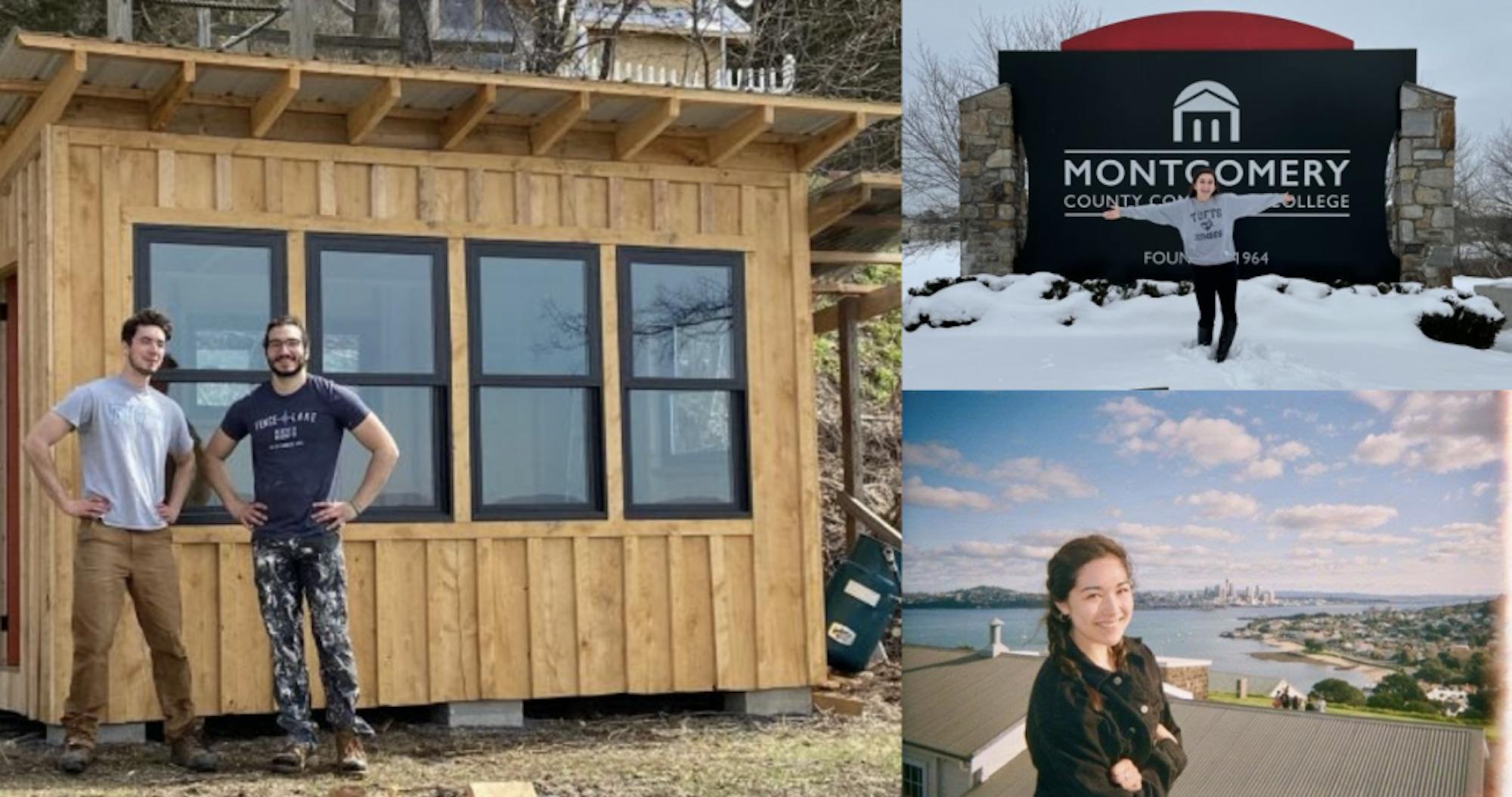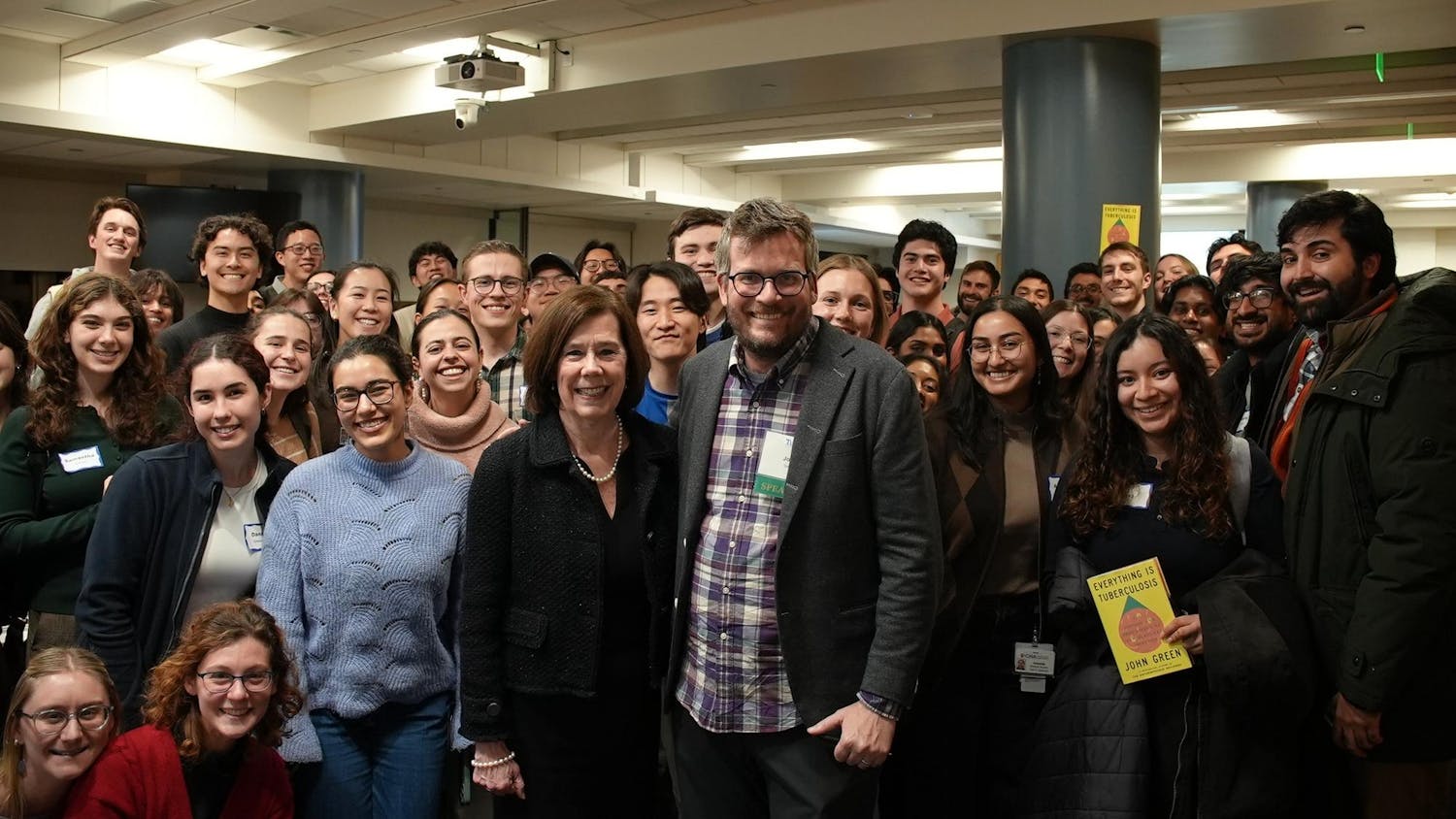The uncertain circumstances prompted by the COVID-19 pandemic forced many students to carefully consider their plans for the 2020–21 academic year. While many chose to continue attending classes at Tufts as previously planned — enrolling either remotely or in person — others decided to take time off, engaging in a wide array of unique experiences.
These are the stories of three students who explored gap semesters or gap years, the memorable moments that shaped their time off and the key takeaways they will bring into their upcoming semester.
Jacob Beiser
Jacob Beiser, now a sophomore, spent his gap year in Ithaca, N.Y. along with his close friend from Tufts, Soliman Aboutaam. They primarily worked as carpenter's apprentices to Beiser’s uncle.
Beiser and Aboutaam helped renovate a run-down lakehouse property that Beiser’s uncle had initially planned to flip, redoing the entire first floor.
“We also ended up building a boathouse next to the water, which is probably one of the more memorable parts of that experience for sure,” Beiser said. Along with various woodworking, construction and painting jobs, Beiser and Aboutaam also babysat for local families.
Beiser explained that he had not set out on his gap year with an intention to learn carpentry, but after being sent home in the middle of his freshman spring semester, he knew that a virtual school wouldn’t be an environment conducive to learning for him.
“I just felt like I wasn't going to be able to fully commit myself to the experience of hybrid learning and hybrid socializing,” Beiser said. “And, I wanted to do something that challenged me and kind of scared me.”
While slightly apprehensive about missing out on a year at Tufts with his friends, Beiser said that the opportunity to learn from his uncle, a carpenter, appealed to him.
“Anything that will help make me grow as a person,” Beiser said. “I just was like, ‘You know what, I got to do it.’ And I was like, ‘What's up Soliman? Let's do this.’”
Beiser remarked that he was surprised to discover how repetitive tasks became a form of meditation.
“I was sanding wood for eight hours,” Beiser said. “Before that, the thought of doing that sounded horrible. But I grew to enjoy it, because I kind of turned it into this weird, meditative [thing], kind of examining my thoughts.”
Moreover, learning from a craftsman and being surrounded by a myriad of materials inspired Beiser to reinvest in his love for visual art. Beiser would make oil pastel drawings on scrap wood from the workshop and create wall art decorations.
“It was definitely a new experience for me using wood as a medium … But it's really cool to be able to hold a physical thing and then do art on a 3D surface because I was just mostly used to doing art [through] drawing,” Beiser said.
Although he does not intend to continue directly pursuing carpentry, Beiser said he will carry with him a greater appreciation for how objects are built in his everyday life. He described his time in Ithaca as a rewarding chance to be deliberate about what he was committing himself to in each moment. At the same time, he separated himself from the pressures of a liberal arts setting, where he said it was easy to be concerned about fully understanding one's future.
“I think doing carpentry — like doing woodworking — taught me to be very present with the work I'm doing and appreciate that and not be focused on sort of an outcome or result and how that might affect my future and my … prospects for the future,” Beiser said.
Small moments of contentment and fulfillment at the end of each day emerged as instances of success, according to Beiser.
“I think every success moment kind of came down to the times when we would stop and reflect on our choices that we had made, recognizing that we kind of had gone against the grain a little bit [and] that we were not surrounded by our friends … that we had made a choice that, although hard, [had] a lot of unknowns, and didn't seem like the move in the beginning,” Beiser said. “Like, we were kind of appreciating the benefits of making a difficult decision that prioritized our well-being in the future over our comfort in the present.”
Coming into this new semester, Beiser expressed a mix of nervousness about engaging anew with academic work and optimism about the love he holds for the Tufts community.
“I'm an undeclared major, but I am excited to reinvest in academics and learning … and just see what that's like,” Beiser said. “And I'm kind of trying to take that challenge, as I took the challenge of going into Ithaca to work as a carpenter.”
Samantha Raymond
During her junior year, Samantha Raymond, an international relations major from Bala Cynwyd, Pa., chose to enroll remotely in the local Montgomery County Community College (Montco) while living at home with her family.
“It was such an incredibly different experience than Tufts,” Raymond said. “But it gave me insights that will inform the rest of my academic career and definitely my life as well.”
Raymond described how she and her family took quarantine very seriously. Shedid not see anyone outside of her parents and brother from March 2020 until getting vaccinated this year, which ultimately informed her decision not to attend Tufts in person. When a friend from high school recommended taking classes at Montco, Raymond said she was willing to give it a try.
“I kind of was like, ‘What's the downside of doing that?’” Raymond said. “If I hate it, I'll stop. And if I love it … I'm safely at home, I'm not paying Tufts tuition, I'm going to Zoom school, but it's a completely new experience.”
For Raymond, her time at Montco was transformative. “I am community college's biggest fan,” Raymond said. “Like I thought it was the most amazing experience of my life. Because, for one thing ... I could take anything that I wanted.”
Raymond found herself taking an assortment of classes, including Criminal Justice, Intro to Homeland Security, Educational Psychology, Biology and even Spanish 1 despite being a French minor. Raymond said she was particularly impressed by the small class sizes and the professors’ willingness to form meaningful one-on-one relationships with the students — even in asynchronous courses.
“The teachers at Montco — I went there for one year — they know me better than all but two professors at Tufts,” Raymond said. “And I was shocked because I love Tufts.”
Learning about other students in her classes proved to be an invaluable part of Montco for Raymond.
“The woman that I was put in the breakout room with ... you could hear stuff behind her,” Raymond said, recalling one instance of meeting a classmate in her biology class. “And I was like, ‘Oh, my God, what's up'... and she was like, ‘I have five kids. I work. Like, I'm in my bathroom so that they can't disrupt this call. I'm just trying the most to get my degree.’”
Contrary to many people's assumptions about community college, Raymond said that her classmates’ life stories — from a retired 80-year-old who used to be in the military to a high schooler getting ahead on credits — left her with a strong admiration for her peers.
“It's just watching people give it their all at a place where people believe that people don't give it anything,” Raymond said. “Like every student that goes to community college, people assume is doing the least, they didn't try in high school, they weren't smart enough to get into college … These incredible people that I met are doing more than anybody else I know, including most people that go to Tufts.”
Raymond found that the coursework was appropriately challenging and engaging and that her professors were accommodating and reasonable; in some cases, when compared to Tufts, Raymond said that the difference was in grading styles and harshness.
“Community college has such a bad rap for being either the easy route or like you couldn't get into college ... there are so many stigmas around it and going there, I was so angry at myself that I bought into it,” Raymond said. “So the first ... two months of going there, the biggest learning experience had nothing to do with my classes. It had to do with me looking at how I looked at academics and how I had judged and essentially graded my peers in high school and going through college, and how wrong that impression was.”
Returning to Tufts this semester, Raymond said she hopes to engage more with the surrounding communities and to proudly encourage others to explore community college as an option for their higher education.
Emika Brown
Emika Brown, a junior from Boulder, Colo., lived in Christchurch, New Zealand throughout her spring semester and into mid-July. Brown stayed in apartment-style dorms at the University of Canterbury where she attended in-person classes while also interning part-time and remotely at Speak for the Trees,an urban forestry and green infrastructure nonprofit located in Boston.
Brown found the fall semester on campus at Tufts to be a challenging environment and had been considering taking her spring semester off — whether that meant enrolling in a community college or traveling abroad — toying with her degree sheet to determine what courses she would need to still graduate with her class. After determining that the University of Canterbury offered the necessary courses for a part-time student, Brown worked through the logistics of traveling to and living in New Zealand.
Since her father is from New Zealand, Brown was granted dual citizenship, making her a part of a small and fortunate population that was allowed to enter the country during the pandemic and quarantine for free for the mandated two weeks in government-contracted hotels.
Given that New Zealand experienced very few COVID-19 cases, Brown described the transition between living at Tufts and abiding by social distancing and mask restrictions to entering an essentially pre-COVID-19 lifestyle in New Zealand as rather jarring.
“I left this isolation hotel in February, into legitimately normal life,” Brown said. “It felt like stepping into 2017. Like, everything was overwhelming. Going to the grocery store was literally exhausting.”
Brown shared that she had always envisioned the idea of living abroad by herself as something cool and exciting. However, making friends proved to be very difficult at times. Brown found that the Kiwis tended to be more shy and insular within their long-standing friend groups.
“I didn't expect it to be so challenging, especially because it's a country that I was pretty familiar with, like having gone there a lot growing up because of my dad,” Brown said. “So I wasn't expecting the loneliness of it.”
Between classes, homework and her internship, Brown spent her time climbing with the climbing club, hiking and exploring the New Zealand countryside. During a three-week term break, Brown embarked on a road trip, or “roadie,” with an acquaintance she had met through the hiking club. Brown rented a car and planned a loop through the South Island, home to beautiful mountains, mostly staying in hostels and even on a boat at one point.
The hostel culture is both very prominent and very laid back in New Zealand. Brown explained that a large population of Europeans had traveled to New Zealand in the winter of 2019 pre-COVID-19, and ended up hostel hopping because of restrictions and lockdowns in their home countries.
“And then [the European travelers] will run out of money, so they'll pick fruit for like a month, make a couple $1,000 and then ... move on to the next place,” Brown said. “And they're super interesting because they're all ... super lonely, but they don't want to go home … and they also don't really stick together.”
At one point, Brown and her friend stayed in a hostel up in the mountains, where they shared a six-bunk room packed with German “long-termers” in their late 20s.
“Their stuff was everywhere, like it felt like being in someone's bedroom,” Brown said. “But it was okay because this beautiful Italian man — love of my life — named Danilo would make us coffee every morning.”
It was on returning to Christchurch after this trip that Brown said she started to feel at home in New Zealand, coming back more confident and comfortable in herself.
“During the first term, when I was super lonely and all the Kiwis were really shy … I was the friendliest person you'll ever meet,” Brown said. "I was trying so hard … After [that] short break, I started to get ... a return on investment. I had like five friends — that was a huge turning point.”
For Brown, her personal growth through her time living alone in New Zealand was tricky to pinpoint exactly.
“[I had] to learn how to connect with new people in lots of different settings, from ... short interactions with strangers in hostels … that rapid friendship thing where you just tell someone your life story in a night, versus ... putting out ... constant friendliness and ... not getting anything back in a long time,” Brown said. “But I think it made me a lot better at meeting new people and different types of people.”
Brown recalled memorable snapshots of strangers she had encountered, such as one man from Brooklyn who worked as a bartender for scientists in Antarctica and a carpenter and his pit bull she hitchhiked a ride from.
“I think I definitely learned that age is fake,” Brown said. “I would make friends with people that were like 50, or, like way younger than us.”
It took Brown three months to mentally adjust to Christchurch and by her six-month mark she said she felt very comfortable, having navigated the cultural differences and built a group of friends. Returning to the Boston area in the middle of the summer seemed like an abrupt end to her time in New Zealand, but Brown said she hopes to carry the laid-back and chill attitude of the Kiwis, along with some key slang phrases, into her new year at Tufts. Brown also reflected on the lack of social hierarchy within the culture of New Zealanders, which she said allowed for friendships across age groups.
“Just being more open to ... people that I wouldn't normally have talked to,” Brown said of her outlook on the new semester. “But I think also, my mindset is more like, I had to be really vulnerable with people to make friends … because I felt like I had to take that first step more and more than normal, so I [learned] people really respond to vulnerability. I think that that’s something I will bring into my life here more.”






